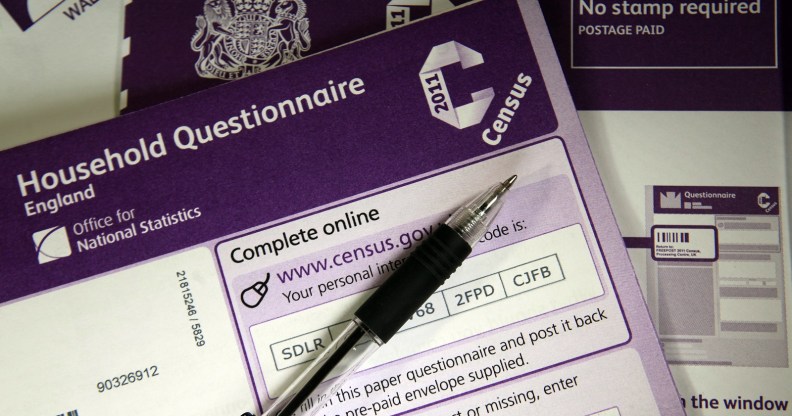UK government wants to ask every person in the country if they’re gay

The 2011 census for England and Wales. (Matt Cardy/Getty Images)
The next UK Census may include questions about sexuality and gender identity for the first time, after the government said questions must be added.
At present, the Census in England and Wales – which is carried out once every 10 years – measures a number of key factors important to monitor the growth of population and social changes.
Though it asks about a number of characteristics including race, marital status and religion, the current census has no way of identifying LGBT people.
But the Office for National Statistics (ONS) has signalled a need for change ahead of the next census, which is scheduled to take place in 2021.
In reports this week, it warns that there is not enough being done to monitor people’s sexual and gender identities, and contemplates adding new questions on the issues.
The ONS concedes it had previously found the issues “not suitable” for the census, on the grounds of “privacy, acceptability, accuracy, conceptual definitions and the effect that such a question could have on the overall response to the census”.
Statisticians have previously also flagged concerns that the self-completing forms do not guarantee privacy among family members – which may lead to under-representation of LGBT people.
However, the Government Equalities Office – headed by Minister for Women and Equalities Nicky Morgan – told the ONS that census data was vital, and that it is not feasible to continue without adding questions.
The GEO said: “The lack of the most basic demographic data on LGB&T populations means service providers and policy makers are required to operate in a vacuum, without the necessary evidence to support decision-making and policy development, for example, estimating the costs, benefits and level of demand for the introduction of civil partnerships and marriage for same-sex couples; estimating the economic benefits of LGB&T inclusive employment policies and practices; and considering the needs of families headed by LGB&T parents.”
“If ONS did not collect census data on sexual orientation in 2021 this would significantly impede the ability of central and local government to improve the planning of service delivery, allocation of resources properly and development of policy to tackle inequality, discrimination and disadvantage for LGB people.
“Census data on the LGB population would provide evidence on the extent of inequalities, which in turn would help to target and improve policy making, particularly in health services, education, employment, housing and social services for LGB groups.”
It added of gender identity: “In the absence of census data by gender identity (regarded as the gold standard by us and many of our stakeholders) there is considerable debate about the size and composition of the transgender population in Britain.
“The absence of basic data on the transgender population results in the invisibility of transgender inequalities and disadvantage for decisionmakers and funders.
“It also limits our ability to systematically research the things which affect these people and understand the multiple dimensions of disadvantage.”
At least eight government departments and bodies are understood to have made representations on the issue – including the Department of Health, the Department for Environment, Food and Rural Affairs (DEFRA), the Department for Culture, Media and Sport (DCMS) – alongside HM Revenue & Customs and Sport England.
The Welsh Government also made submissions alongside scores of local councils – while the Equality and Human Rights Commission also made a representation recommending a change.
It said: “If ONS did not collect information on sexual identity on the 2021 Census, then surveys would remain the only source of information on sexual identity.
“If access to those surveys remains the same as now, the impact will be that only limited information is available disaggregated by sexual identity and, as a result, we will not be able to monitor many issues with respect to sexual identity. This will limit the coverage of our statutory reviews and our ability to obtain evidence on issues relating to sexual identity.”
The ONS says it will carefully evaluate any questions on the issue, which would likely need to be sensitive enough to gather data from respondents while still gathering accurate, usable data.
Any change to the census to monitor new characteristics would require legislation to pass through Parliament, due to its unique legal status.
2021 census director Ian Cope told the Guardian: “Given the unique status of the census, it’s not surprising that there is continued user need for existing topics as well as requests for new topics to be included in 2021.
“As data from the census underpins so many important policies and decisions that affect us all, we need to make sure that people find it straightforward and acceptable to complete.
“We will continue to discuss this balance with everyone who will be relying on the trusted data that the 2021 census will provide, and to test different question options.
“We are also looking at existing sources of administrative data that could provide the information needed without having to include questions in the census.”
Though occurring at the same time as the census in England and Wales, the National Records of Scotland and Northern Ireland Statistics and Research Agency are responsible for the census in Scotland and Northern Ireland.

